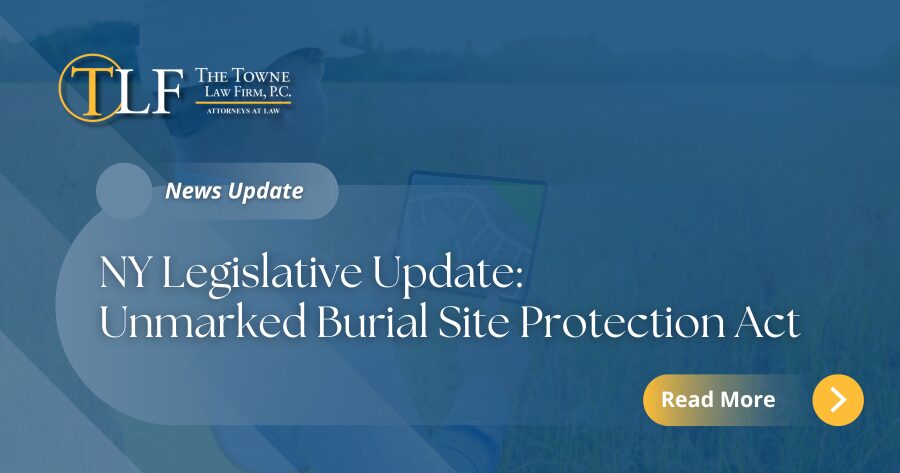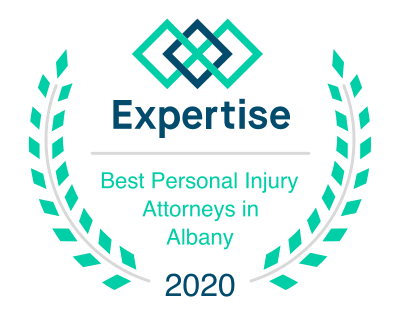NY Legislative Update: Unmarked Burial Site Protection Act
Jul 17, 2024ALBANY, NY | The State of New York has enacted the “Unmarked Burial Site Protection Act,” a significant piece of legislation aimed at the discovery and disposition of human remains and funerary objects. This new law amends New York’s Not-for-Profit Corporation Law, the Executive Law, and the Education Law to provide comprehensive guidelines for handling unmarked burial sites, ensuring respectful and culturally sensitive treatment of human remains and associated artifacts.
The Towne Law Firm is committed to delivering tailored legal services across diverse industries and practice areas, ensuring equitable access to our expertise for all clients. As new legislation emerges, our firm excels in conducting comprehensive analyses, providing clear insights tailored to our clients’ needs. We prioritize prompt and dedicated representation, offering proactive guidance to navigate evolving legal landscapes effectively.
This legislative update aims to inform stakeholders about the significant changes brought by the “Unmarked Burial Site Protection Act” and provides tailored recommendations for municipalities, real estate developers, colleges, and museums to ensure compliance and cultural sensitivity in their respective fields.
At The Towne Law Firm, we recognize the diverse impacts of this legislation and are prepared to offer specialized guidance tailored to the specific needs of stakeholders. Whether navigating compliance requirements, advocating for regulatory adjustments, or defending against potential disputes, our firm stands ready to provide insightful legal strategies that safeguard our clients’ interests and promote their long-term success in this evolving regulatory landscape.
Implications for Municipalities
This new legislation imposes critical implications for municipalities. It affects municipal planning and development initiatives, requiring careful consideration of how to integrate new regulatory requirements. Infrastructure projects and public services will also need to align with these changes, potentially influencing project timelines and budgets. Transparent communication with communities and stakeholders will be essential to address concerns effectively. At our firm, we offer guidance on navigating these impacts and can provide tailored strategies to ensure compliance and optimize municipal governance structures.
Guidance for Real Estate Developers
For real estate developers, there are several key implications to consider. Any discovery of a burial site during construction or ground-disturbing activities must be reported immediately to the county coroner or medical examiner. All construction activities must cease until a thorough investigation is conducted. If the remains are deemed more than fifty years old, the state archaeologist and the Native American burial site review committee will be involved to determine cultural affiliation and notify relevant groups. Developers must coordinate with descendants or culturally affiliated groups and the property owner to establish a disposition plan, with a preference for keeping remains interred where found. Unauthorized disturbance or removal of human remains and funerary objects is strictly prohibited and subject to legal penalties, including misdemeanors.
Developers’ Obligations and Risks
Given New York’s rich history and its many Native American tribes, developers should be aware that they may come across artifacts or burial sites during their projects, making it crucial to follow the Act’s guidelines. This can impact development projects by causing potential delays due to the investigation and disposition processes, incurring costs associated with the cessation of work and compliance with disposition plans, and posing legal and reputational risks for non-compliance.
To mitigate these risks, developers should conduct thorough pre-construction surveys to identify potential burial sites, ensure full compliance with reporting and disposition procedures, and engage with archaeologists, the state, and culturally affiliated groups early in the project planning process. Our dedicated team of attorneys are here to guide real estate developers by providing legal counsel on the implications of NAGPRA, ensuring developers understand their obligations under New York state law. Additionally, our real estate attorneys can offer guidance on the State Environmental Quality Review Act (SEQRA), assisting clients through all stages of this process, and help develop robust policies that align with NAGPRA regulations. We guide developers through the procedural steps mandated by NAGPRA, ensuring compliance with state and federal regulations, and provide robust defense strategies in cases of dispute or litigation to protect developers’ rights and interests under NAGPRA and related laws.
Considerations for Colleges and Museums
For colleges and museums, there are several key implications to consider under the new legal standards. Colleges conducting archaeological research or construction on campus must adhere to the new reporting and handling procedures for discovered human remains. This presents an opportunity to integrate new legal and ethical standards into relevant academic programs, such as anthropology, archaeology, and history, and underscores the importance of providing training on cultural sensitivity and legal compliance for students and faculty involved in fieldwork. For museums, it is crucial to ensure proper documentation and handling of any funerary objects and human remains in their collections, engaging with culturally affiliated groups to determine the appropriate stewardship and disposition of these items, and educating the public on the significance of the Unmarked Burial Site Protection Act and its impact on preserving cultural heritage.
Educational and Compliance Strategies
The impact on campus activities includes the need for updated research protocols for archaeological digs and other ground-disturbing research activities, potential for collaboration with Native American tribes and culturally affiliated groups for educational and research purposes, and allocation of resources to ensure compliance with the new law and its integration into academic programs. For museums, this means enhanced protocols for the management and documentation of human remains and associated artifacts, the development of exhibits and educational programs highlighting the importance of respecting and protecting burial sites, and ensuring legal and ethical compliance in all aspects of artifact handling and display.
To address these changes, colleges should update campus policies and research protocols to reflect the new legal requirements, implement training programs on the Unmarked Burial Site Protection Act and cultural sensitivity, and foster partnerships with Native American tribes and other culturally affiliated groups to enhance educational experiences and compliance efforts. Museums should conduct a comprehensive review of their current collections to ensure compliance with the new law, collaborate with Native American tribes and other culturally affiliated groups for guidance and partnership in stewardship efforts, and develop educational programs and exhibits to raise awareness about the Unmarked Burial Site Protection Act and cultural heritage preservation.
Legal Counsel and Support
Our dedicated team of New York attorneys can assist colleges and museums by conducting risk assessments to evaluate all potential risks and liabilities related to this Act, ensuring that your institution remains compliant. Our team of dedicated attorneys will thoroughly review existing policies to ensure they meet the new legal requirements and help develop robust policies and procedures that protect your institution from the implications of these new regulations, ensuring full compliance with New York State law.
Recently joining the firm’s team of attorneys, Mark Houston has an extensive background in Native American Law and the regulations put on the various tribes and their lands. His expertise includes navigating the complexities of federal and state laws affecting Native American tribes, particularly in the areas of land use, cultural resource protection, and tribal sovereignty. Mark’s deep understanding of these regulations allows him to provide invaluable insights and guidance to clients dealing with issues related to Native American burial sites, ensuring compliance with the Unmarked Burial Site Protection Act and other relevant legislation. With his addition to our team, we are further equipped to offer specialized legal support to stakeholders affected by this new law.
Written by Partner, Mark Houston.
The attorneys and professional staff of The Towne Law Firm, P.C. (TLF) comprise a general practice law firm advising clients and trying cases in a broad range of legal fields. From matters as small as a traffic ticket to the most complex business disputes, you may rely on our experience and availability. Our five offices are in New York, Vermont, and Massachusetts, but the scope of our legal practice ranges from transactional to litigation services. Our team approach ensures our clients are provided with comprehensive service and personalized attention.
Contact Us Share














